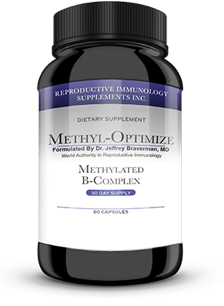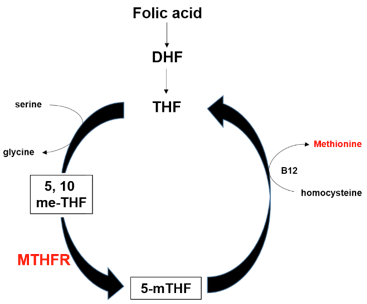Methyl-Optimize: Cocktail of Methylated Folate and essential B vitamins to improve male fertility!
Posted By Braverman IVF & Reproductive Immunology || 22-August-2018
Methyl-Optimizeis the latest product of our dietary supplement range.
Our Methyl-Optimize supplement contains Methylated Folate (that benefits patients with detrimental MTHFR polymorphism) in addition to essential B vitamins (B2+B6+B12) which hold great potential in reducing oxidative stress, supporting adequate homocysteine metabolism and methylation process thus counteracting sperm oxidative damage and boosting your sperm quality!
Methyl-Optimize is now available for purchase online.
 Our formula includes:
Our formula includes:
Methylated Folate (Vitamin B9) allowing optimum methylation process and homocysteine metabolism especially in patient with MTHFR polymorphism (MTHFR 677C/T and/or MTHFR 1298A>C), in addition to scavenging free radicals
Riboflavin (Vitamin B2) supporting testosterone production and sperm motility
Pyridoxin (Vitamin B6) promoting spermatogenesis, testosterone levels as well as sperm motility with his potent anti-oxidant activities
Vitamin B12 keeping homocysteine levels and inflammation under control thus preventing oxidative stress and its damaging effects on sperm membrane
In this blog, we will describe the studies showing how the different ingredients used in our dietary supplement could positively impact your semen’s parameters and help improve your fertility.
1- Methylated folate and B12 vitamin
a- MTHFR polymorphism: what is it?
Up to 40% of male infertility cases are idiopathic (1). Genetic causes such as microdeletions on the Y chromosome are the main culprit (2) but gene polymorphism could be involved in disrupted spermatogenesis and male infertility. Besides its key role in DNA methylation, the methylenetetrahydrofolate reductase MTHFR is directly involved in folate metabolism and homocysteine regulation. Homocysteine is an amino acid derived from the metabolism of methionine, an essential amino acid. Normal MTHFR activity (Figure 1) is crucial to maintain normal levels of circulating folate and methionine and to prevent the accumulation of homocysteine (that is toxic). Further a decreased MTHFR activity induces DNA methylation abnormality.
Hyperhomocysteinemia is observed in approximately 5% of the general population and is associated with increased risk for many inflammatory disorders including auto immune disorders (Rheumatoid Arthritis, Diabetes, Multiple Sclerosis, Systemic Lupus erythematosus, Grave disease), vascular and neurodegenerative diseases.
Increased amount of homocysteine can cause oxidative stress and DNA damage (3).

Adapted from Jason W. Locasale. Nature Reviews Cancer 13, 572–583 (2013)
Figure 1: The folate cycle and the methionine cycle are two metabolic pathways existing independently. In the folate cycle, folic acid is imported into cells and reduced to tetrahydrofolate (THF). THF is converted to 5, 10-methylene-THF (me-THF). Me-THF is then reduced to 5 methyltetrahydrofolate (mTHF) by methylenetetrahydrofolate reductase (MTHFR). 5-mTHF is demethylated to complete the folate cycle by donating a carbon into the methionine cycle through the methylation of homocysteine (hCYS) by methionine synthase and its cofactor vitamin B12 (B12).
Folate metabolism can be impaired by 2 different polymorphisms of MTHFR:
MTHFR 677C/T
MTHFR 1298A/C
These genotypes reduce DNA methylation, and possibly increase chromosomal instability.
MTHFR 677CC: normal MTHFR activity
MTHFR 677CT: 35% loss in MTHFR activity
MTHFR 677TT: 70% loss in MTHFR activity
MTHFR 1298AA: normal MTHFR activity
MTHFR 1298AC: slight decrease in MTHFR activity
MTHFR 1298CC: 40% loss in MTHFR activity
MTHFR 677CT + MTHFR 1298AC = lowest MTHFR activity
MTHFR 677C/T is associated with a significant decrease of MTHFR enzymatic activity that can reach up to 70% in homozygous (MTHFR T/T), while the heterozygous (C/T) genotype has a 35% decreased activity. MTHFR 1298A>C polymorphism results in a slight decrease in MTHFR activity. Nevertheless, double heterozygote MTHFR 677 C/T and 1298 A/C results in the lowest MTHFR activity.
b- MTHFR activity, B12 vitamin and male infertility
Many studies have linked MTHFR T/T (homozygous mutation) or C/T (heterozygous mutation) as well as double heterozygote MTHFR 677 C/T and 1298 A/C genotypes with:
Low sperm count
Low sperm motility
Male infertility
Folate deficiency has been correlated with:
sperm aneuploidy (4)
sperm DNA damage (5)
low sperm count (6)
While total homocysteine (tHcy) concentrations in seminal plasma has been linked to:
male subfertility
low embryo quality (7).
In a study involving N=280 men (8) with impaired spermatogenesis, a higher prevalence of MTHFR 677 CT and 677 TT genotypes was found in severe oligospermic (semen with low concentration of sperm) and azoospermic men (absence of motile sperm in the semen) while a higher prevalence for 677 TT/A1298 AC and 677 CT/A1298 AC have been linked with male infertility. More interestingly, men who had consumed daily vitamins B12 and B9 ≥ 2.4 µg and ≥0.4 mg, respectively, had significantly reduced homocysteine levels in comparison to men who had a daily intake of vitamins B12 and B9 < 2.4 µg and <0.4 mg.
Higher levels of B12 and B9 vitamin induce significant and beneficial effects on sperm concentration (2-fold increase) and motility (1.7-fold increase).
Further, several studies reported that MTHFR 677T has a reduced activity under low or normal folate levels but a normal activity under conditions of higher folate nutritional status (9). The authors proposed that folate itself could protect MTHFR activity by stabilizing the MTHFR protein and therefore allowing it to function normally.
B12 Vitamin in the form of Methyl cobalamin has also shown dramatic benefits on semen parameters. Vitamin B12 is required for DNA synthesis, as well as amino acid and fatty acid metabolism (10). B12 serum levels are lower in infertile men as compared to fertile controls (11).
When administrated to infertile men over a period of 8-60 weeks (1,500 µg/day), sperm parameters were increased by 60 % (12).
In another study (13), when administrated to infertile men (1,500 µg /day), the sperm analysis conducted after eight weeks showed:
an increase in sperm concentration in 38.4% of men
an increase in total sperm count in 53.8% of men
an increase in sperm motility in 50% of men
When administrated at a high dose (6, 000µg/day) to men with a low sperm count, a 57% improvement has been noted (14). Even at a lower dose (1,000µg/day), when administrated to men with low sperm count, a 5-fold increase has been noted in 27% of men (15). More recently, a study (16) showed that the integrity of sperm DNA in varicocele men can be improved by multivitamin/antioxidant therapy, including vitamin B12 with sperm DNA fragmentation decreasing by about 22.1%.
Finally, B12 vitamin has a very potent reducing potential (17) and anti-inflammatory properties (18) that may have beneficial effects as reported (19) with:
the prevention of oxygen radical generation
thus, decreasing the damaging effect of lipid-peroxidation to sperm membranes
and improving sperm motility and viability
-
These data showed the critical impact of B9 and B12 vitamins on sperm parameters and male fertility especially in men with T allele MTHFR genotype.
Our Methyl-Optimize supplement provides you with optimal concentrations of methylated-folate (the active form of folate) and vitamin B12 to restore adequate MTHFR activity and support your fertility.
2- B2 vitamin (Riboflavin)
Riboflavin is one of the essential nutrients needed in testosterone production (20)
A study led in rat (21) showed that a riboflavin deficient diet induces:
A significant decrease in sperm count
A reduced daily sperm production
A significant decrease in anti-oxidant enzymes such as catalase, superoxide dismutase (SOD) and glutathione peroxidase (GSH-Px)
Riboflavin stimulates the motility (22) by increasing fructose utilization and oxygen uptake and inhibiting lactic acid production, a known factor reducing sperm motility (23).
3- B6 vitamin (pyridoxine)
Vitamin B6, also known as pyridoxine is a key B vitamin and is a coenzyme to many processes including ones involved in homocysteine metabolism. A deficiency in vitamin B6 causes accumulation of homocysteine (24) and was linked to altered spermatogenesis (25) while a diet rich in B6 vitamin inversely correlated with total homocysteine levels (tHcy) in blood and seminal plasma (26). Interestingly, deficiencies in dietary B6 vitamin further increases DNA hypomethylation in carriers of low activity genetic variants of MTHFR (27).
Involved in the synthesis of testosterone, follicle-stimulating hormone (FSH) and luteinizing hormone (LH), Vitamin B6 plays a key role in the testicular function (28) and animal studies have shown decreased testosterone levels in B6 vitamin deficient rats (29). Vitamin B6 has also a potent anti-oxidant activity counteracting oxidative damage to sperm (30) that will protect sperm motility.
The Methyl-Optimize supplement is the result of our extensive work in finding the best ingredients to counteract oxidative stress induced-DNA damage, replenish your anti-oxidant reservoir and boost your semen quality!
Our cocktail of methylated folate and B Vitamins can reduce oxidative stress and inflammation by supporting adequate folate and homocysteine levels thus inducing optimal seminal plasma composition to allow semen development and maturation into spermatozoa with the best fertilization potential.
Methyl-Optimize is now available for purchase online.
For more information about our supplements range, please consult our website.
References